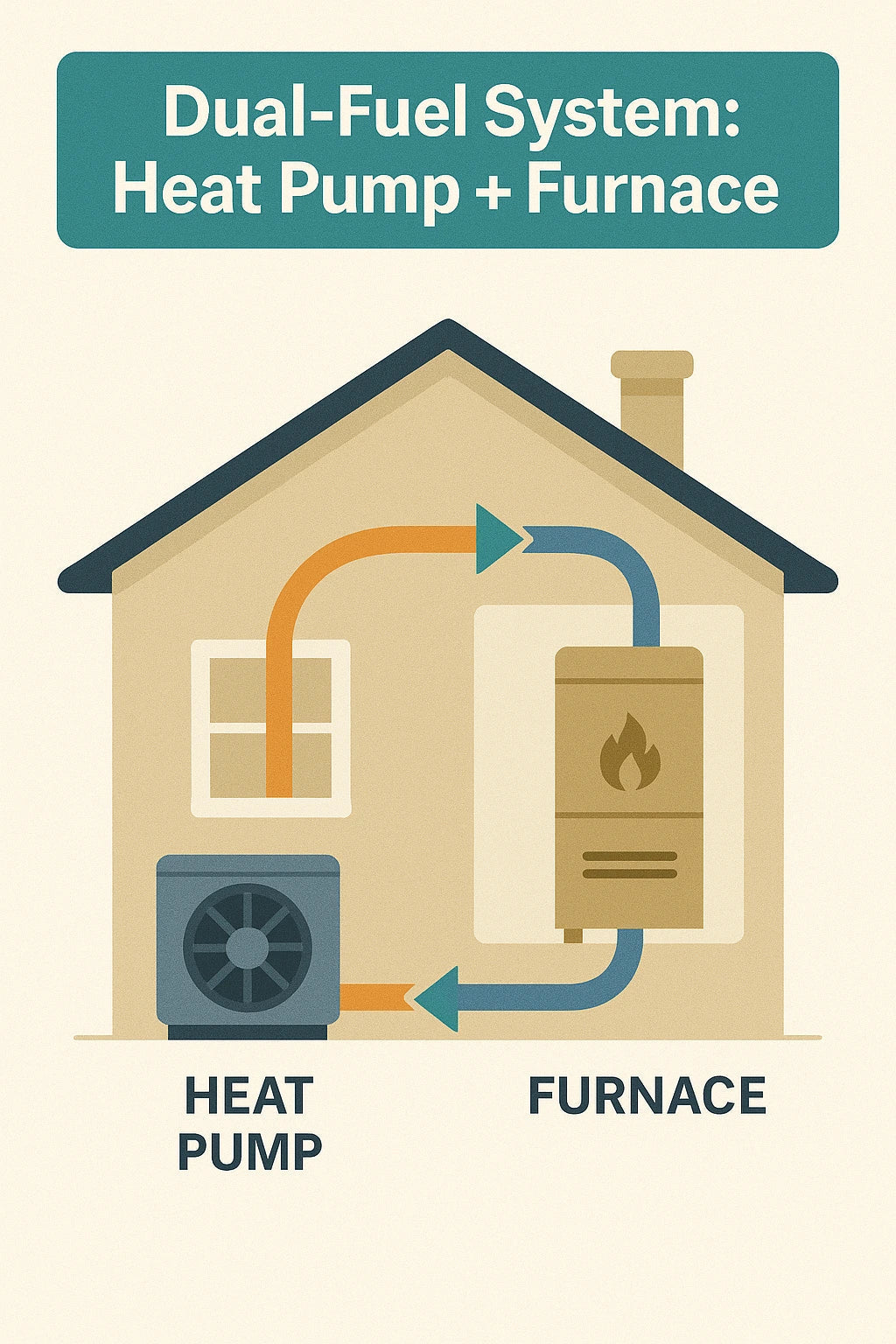Pairing a furnace with a heat pump—often called a dual-fuel system—is becoming increasingly popular with homeowners who want year-round comfort, lower energy bills, and a reliable backup heating solution. But when it comes to choosing the right furnace to complement your heat pump, is gas or electric the better option?
The answer depends on your home’s infrastructure, local utility rates, and climate. In this guide, we’ll explore how each type of furnace works with a heat pump and what to consider before making a decision.
👉 For a bigger picture comparison, check out our main guide: Gas vs. Electric Furnaces: Which is Better?
Why Pair a Furnace with a Heat Pump?
A heat pump is highly efficient at moving heat rather than generating it, making it ideal for moderate climates. However, when outdoor temperatures drop below freezing, a heat pump’s efficiency declines. That’s where a furnace comes in:
-
Gas furnaces act as a high-output backup when temperatures plunge.
-
Electric furnaces serve as a simpler supplemental system in milder regions.
The U.S. Department of Energy notes that dual-fuel systems can significantly cut annual energy costs by using the heat pump when it’s most efficient and switching to a furnace when it’s not.
How Gas Furnaces Work with Heat Pumps
Performance in Cold Weather
In colder climates, gas furnaces shine. When your heat pump can’t keep up, the gas furnace takes over with powerful, fast-heating performance. This “hybrid” approach ensures your home stays warm even during sub-zero temperatures.
Cost and Utility Considerations
Natural gas remains one of the most cost-effective fuels for heating per BTU in much of the U.S. According to Energy Star, high-efficiency gas furnaces can achieve 95% AFUE or higher, which maximizes fuel use and lowers bills. For households dealing with rising electricity costs, this makes gas a compelling partner for a heat pump.
Safety and Installation Needs
Pairing a gas furnace with a heat pump requires:
-
Proper venting or flue installation.
-
Annual inspections and tune-ups for safety.
-
Carbon monoxide detectors as recommended by the EPA.
For older homes with chimneys or existing gas lines, a gas furnace may integrate more easily.
How Electric Furnaces Work with Heat Pumps
Performance in Milder Climates
Electric furnaces work best in regions where winters are short and mild. The heat pump does most of the work, and the electric furnace only kicks in as backup during the coldest nights.
Cost and Efficiency
On a per-BTU basis, electricity is often more expensive than gas. However, in areas with off-peak utility pricing or renewable energy integration, electric furnaces can be cost-competitive. The ASHRAE emphasizes that total efficiency depends not only on equipment but also on insulation, duct sealing, and overall home performance.
Installation and Maintenance
Electric furnaces are easier to install since they don’t require venting. They also need less maintenance—no combustion chamber or flue to clean. But there’s a caveat: many older homes need electrical panel upgrades to handle the added load. The International Code Council sets the residential standards that govern safe installation of high-load appliances like electric furnaces.
Gas vs. Electric Furnace Pairing with Heat Pumps: Key Comparisons
| Factor | Gas Furnace + Heat Pump | Electric Furnace + Heat Pump |
|---|---|---|
| Climate Fit | Best in cold regions | Best in mild climates |
| Operating Costs | Typically lower (gas cheaper per BTU) | Higher, unless paired with renewables |
| Installation | Requires venting, gas line access | Easier install, may need panel upgrade |
| Maintenance | Annual inspections needed | Minimal |
| Safety | CO risk—detectors required | No combustion risk |
Choosing the Right Furnace for Your Heat Pump
Step 1: Assess Your Climate
-
Cold northern regions: Gas furnaces provide reliable, powerful heat.
-
Mild southern or coastal regions: Electric furnaces may be sufficient.
Step 2: Compare Utility Rates
Local gas vs. electric rates will heavily influence long-term costs. The DOE offers state-by-state resources on energy prices and efficiency programs.
Step 3: Evaluate Your Home’s Infrastructure
-
Do you have access to natural gas lines?
-
Is your electrical panel modern enough for high-capacity loads?
-
Will building codes require significant upgrades?
Step 4: Factor in Long-Term Trends
Climate policy is gradually steering some regions toward electrification. If you plan to stay in your home long-term, pairing a heat pump with an electric furnace may align better with future energy regulations.
Final Takeaway for Homeowners
So, do gas or electric furnaces work better with heat pumps?
-
Gas furnaces are usually the stronger choice in colder regions where backup heating power and reliability are critical.
-
Electric furnaces are often more practical in mild climates, all-electric homes, or when you want a simpler, lower-maintenance setup.
The bottom line: the best system is the one that fits your home’s infrastructure, local utility rates, and climate. An HVAC professional can help you weigh costs, safety, and efficiency so you get a system that delivers comfort without draining your budget.
👉 Next up in this series: How Local Building Codes Impact Gas vs. Electric Furnace Installs
Alex Lane
Your Home Comfort Advocate







